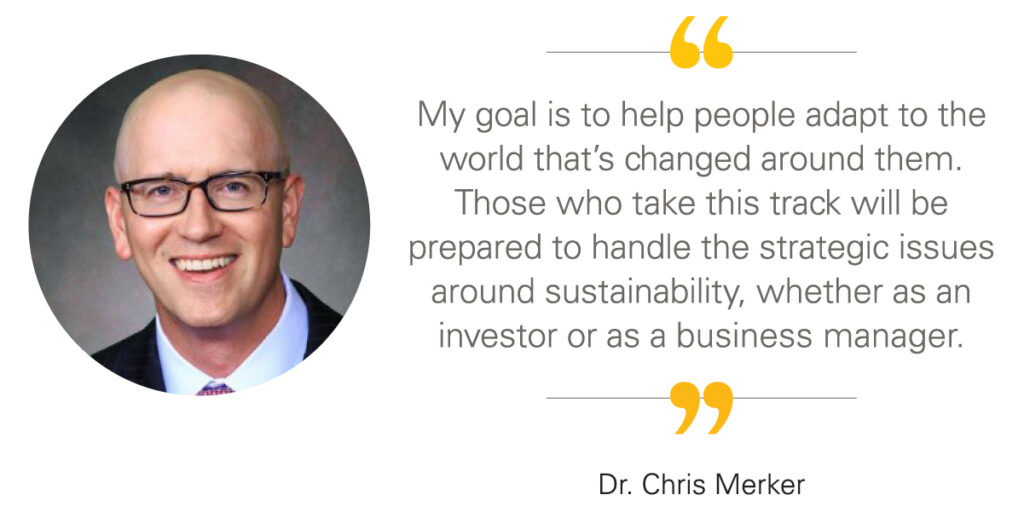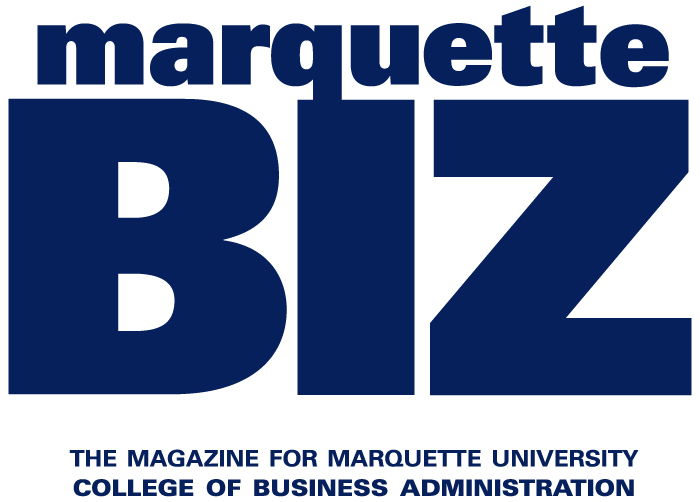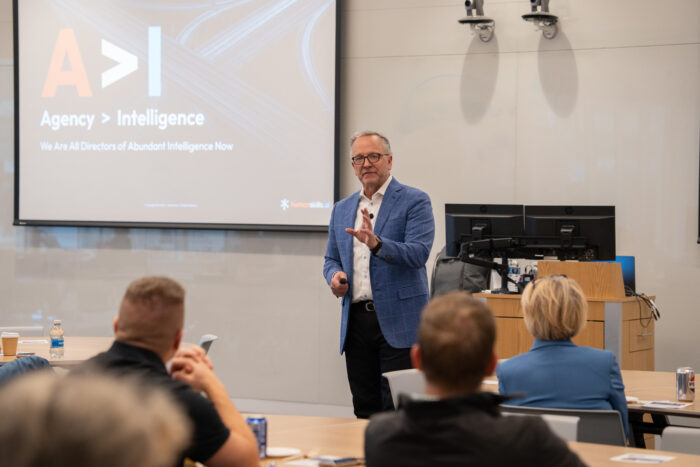Finding value in educating investors of the future to Be The Difference, Marquette Business builds up its ESG curriculum.

By Hal Conick
When Dr. Chris Merker began teaching ESG — environmental, social and corporate governance — at Marquette in 2009, his classroom was filled with blank stares.
“People didn’t really give it too much thought back then,” Merker, Grad ’17, says.
By that point, Merker, a director of Private Asset Management at Robert W. Baird & Co., had been thinking for years about ESG. The U.S. had recently been through two economic downturns, and Merker had been trying to understand why. When he first heard about ESG, around the time the United Nations founded its Principles for Responsible Investment initiative in 2005, he thought that between a growing list of corporate governance failures and rising stakeholder concerns, perhaps it could offer a window into why the world was struggling.
ESG is far different from traditional accounting. Accounting is typically viewed purely from financial statements — an organization’s value on paper was its true value. But, according to research by Ocean Tomo, over the past 50 years, the market value of companies has become increasingly disconnected from its book value. ESG has fostered new ways to understand factors that don’t show up on a financial statement — including reputation, relationships with employees, and how an organization may have exposures to growing environmental risks.
More than a decade later, Merker says everything has changed. He no longer receives blank stares when discussing ESG, which has morphed into a new language of accounting standards and metrics. This is a language that corporations, investors and students alike are all scrambling to learn.
“ESG is an evolved way of understanding the value and risk of companies,” says Merker, still a director at Baird, who also publishes the blog Sustainable Finance and conducts research in partnership with Marquette through his ESG research firm, Fund Governance Analytics.
Popularity sparks new courses
The proof of ESG’s ascendancy can be tracked through a surge of corporate interest. In 2011, only 20 percent of S&P 500 companies produced a sustainability report, according to the Governance and Accountability Institute. A decade later, 92 percent produced a sustainability report.
Investment interest in ESG has also skyrocketed. Last year, Morningstar reported that the first quarter of 2021 saw an all-time record of fund flow, with $21.5 billion going to ESG funds. Bloomberg Intelligence reported that global ESG assets may surpass $50 trillion by 2025, which would be a third of total assets under management.
And these surges have led to great interest from educational institutions.
Marquette was early in teaching ESG — Merker says it was the first university in the U.S. to offer a sustainable finance course — but most major universities are now bolstering their ESG repertoire.
Marquette is no exception. Merker is now developing an ESG executive education track at Marquette, which he plans to launch in fall 2022. This will be a four-course track, allowing students to obtain two of the top industry certifications from the CFA Institute and the Sustainability Accounting Standards Board. Merker has recruited industry professionals to help build these courses, including Dan Romito, former head of ESG analytics at NASDAQ; John Mueller, vice president of marketing at Dana Investment Advisors; and Noelle Brigham, Eng ’97, Grad ’99, a consultant and Marquette engineering instructor of practice.
“My goal is to help people adapt to the world that’s changed around them,” Merker says. “Those who take this track will be prepared to handle the strategic issues around sustainability, whether as an investor or as a business manager.”
In addition to the new course work, Merker also led Marquette’s Sustainability 2.0 Conference in fall 2019 and 2021, with the goal of making this the go-to regional ESG conference in the Midwest. “We’re continuing to build up these programs and partnerships with other major corporations and investment firms,” Merker says.

Interest grows beyond finance
Interest in ESG and sustainability at Marquette goes beyond finance, as other colleges at Marquette have taken interest. Engineering has classes on renewable energy and sustainable product development, for example, and Merker teaches a business and finance course with an ESG component at the Marquette Law School. The college is also planning to add an Introduction to ESG course next year in conjunction with Marquette’s Opus College of Engineering and Center for Peacemaking.
On the supply chain side, another new course on sustainability will be launching at the start of the 2022–23 school year. Dr. Marko Bastl, associate professor of supply chain management and director of Marquette’s Center for Supply Chain Management, says the center is developing a course for undergraduate students that will allow them to explore supply chain sustainability issues in less developed parts of the world.
The course’s curriculum will be developed in collaboration with Global Brigades, a nonprofit health and sustainable development organization that works to reduce inequalities across the world, co-founded in 2003 by alumna Dr. Shital (Chauhan) Vora, H Sci ’04, PT ’06. Initially, Bastl says, the course will allow students to use their knowledge of the supply chain to help communities in Central America over video communication tools. But once COVID-19 restrictions are lifted, undergraduate students can travel to work with these communities in person.
“It’s going to be a transformational experience,” Bastl says. “In the developed world, we assume resources are available — vehicles, infrastructure, workers, knowledge. But when you get into less developed parts of our planet, that assumption doesn’t hold.”
Working on problems without the developed-world tool kit will mean students will need to be creative thinkers. If they’re successful, Bastl believes that students will see firsthand that even small changes — developing an inventory management system or helping with the supply of fresh water — can make a significant difference in people’s lives.

A big opportunity awaits
Tim Hanley, Bus Ad ’78, acting Keyes Dean of the College of Business Administration, retired from Deloitte in 2019 after nearly 40 years working in public accounting. Shortly before he left, he says, Deloitte saw ESG and sustainability as a real opportunity for clients. He believes that there’s also a big opportunity for Marquette and its students.
“There will soon likely be regulations that will require more disclosure around ESG,” Hanley says. “There’s a real opportunity for people to have careers in this space. There’s no doubt that companies are gearing up to have their own capabilities.”
With the world waking up to ESG, Merker wants all his students to be prepared. He believes that every major company and investment firm will soon have a sustainability function — if it doesn’t already. To prepare students, Merker hopes to continue the trend of collaboration between colleges at Marquette.
Bastl believes that sustainability may be the topic that can bring the entire university together. “It requires the cooperation between the natural sciences, engineering, business and more to effectively solve it,” he says. “I’m happy that this is a movement at Marquette and happy that supply chain and finance are leading it in the College of Business.”
This kind of collaboration is great for the college, Hanley says, but it’s also great branding for Marquette and an advantage for students’ careers. Companies that advise Marquette often mention to him how important ESG is, Hanley says. He believes that having courses available for all levels — including executive education for those already in the workforce — will be a boon for all involved.
The challenge is in front of us
The blank stares of Merker’s first Sustainable Finance class are gone, but Merker says that the needle isn’t moving as quickly as would be ideal. Research is indicating that global emissions are still rising, for example. And the Western states, amid a 20-plus-year megadrought, are often bone dry and on fire.
There’s no easy solution to sustainability concerns, Merker says — ESG is a complex answer to a complex problem. But he believes that studying ESG, teaching it to the next generation and creating more awareness across corporations are essential pieces to moving forward.
“I think this is headed in the direction of making the world sustainable for generations to come. A lot of what needs to be done is to rethink how we live, where we live, and what kind of activities we undertake. This is a major, major transformation,” Merker says. “I’m excited that we are educating our students to be prepared to embrace these challenges and discover innovative solutions to them.”




